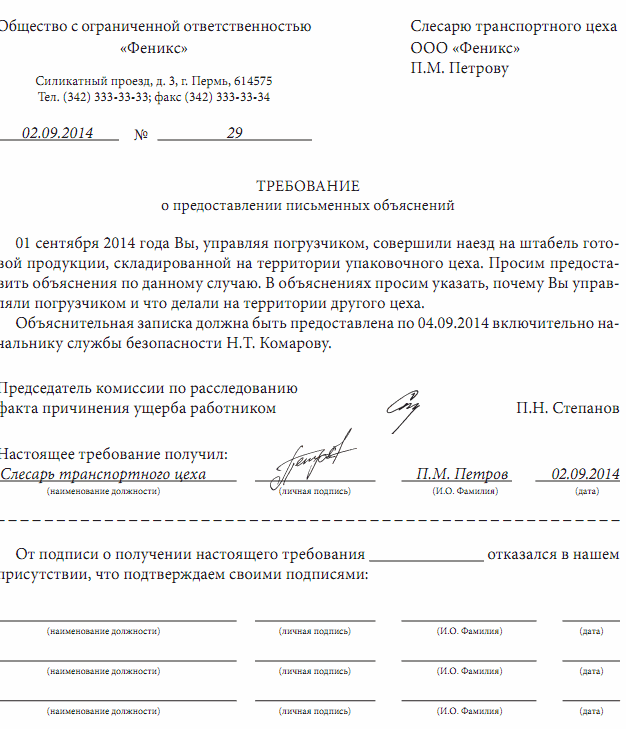Last modified: January 2021
The excess in the eyes of management of the importance of an employee as a specialist over the moral and ethical standards of an individual allows an arrogant person to ignore the rules of labor discipline. If the employer personally does not care so much about unquestioning adherence to working hours, then a lack of response can lead to anarchy in the team. In order to actually hold people accountable, specific norms must be written down in documents, otherwise how can one record the tardiness of an employee who has not confirmed by signature the schedule of the established working hours?
It really looks like the truth!
Frankly, what we were told is practically beyond doubt. For example, these two opinions very well describe the attitude of directors towards the tardiness of their employees:
“My company has 34 employees, not including me. We have it this way: if you are 5 minutes late, you are guaranteed to work 10 minutes at your workplace. If for 10 minutes - 20, etc. Those who found this rule unfair have not worked for us for a long time. Now people have become more disciplined, however, there are still those who are ready to work more, but at the same time afford not to come to work on time. I don’t know about others, but that’s how I was raised – you need to be punctual, period. Personally, I have no respect for those who are not punctual. Punctuality is a quality of a business and serious person. If he doesn’t exist, then such a subordinate works through a stump, but I don’t need such people.”
Or here's something else interesting:
“When I got tired of the endless tardiness of individual employees, I did not fire them, but decided to shame them as an experiment. As soon as he is late again, he immediately begins to write an explanatory note with a detailed story about why this happened. Formulations such as “for family reasons” or “overslept” are not suitable. I force them to answer questions: why did I oversleep, what do family circumstances mean? Of course, this makes them very uncomfortable and I understand them perfectly well. This is the whole essence of this measure. In order not to humiliate themselves in front of me every time, they probably just run out of the house so as not to be late. I'm quite happy with that."
These two opposing, but somewhat similar opinions clearly show that the director, as a rule, chooses measures to combat delays based on his own preferences and character traits, and not from the point of view of basic humanity and the desire to maintain a positive climate within the team . Moreover, the director very often does not take into account the opinions of his employees, realizing somewhere in the depths of his soul that absolutely anyone can be late, including himself. It is clear that directors “are not late, but delayed” - this expression is well known to everyone. But what can we do in good conscience? If you demand strict discipline from your subordinates, demonstrate no less discipline by your own example. This will at least be more convincing.
Disciplinary penalties
For failure by an employee to fulfill his duties, disciplinary sanctions are imposed on him in accordance with Article 192 of the Labor Code of the Russian Federation. These include the following:
- reprimands for being late for work,
- dismissal,
- comment.
If absenteeism occurs more than once, the employer can fire the person. When imposing punishment, the severity and circumstances of the act are taken into account. It is applied no later than thirty days from the date of violation, not counting the time when the employee was sick or on vacation. But disciplinary action for being late for work is not applied after six months have passed since the offense.
A few more inhumane methods
In general, inhumane methods of dealing with employee tardiness are more common in domestic practice than the opposite. Directors prefer to create discomfort for their subordinates, which would force them not to violate the internal rules of the company. Of course, the above cases should work, but is there really no other way to deal with lateness? Probably, it is possible, but now the following forms of influence are also popular, bordering on violation of the requirements of the Labor Code of the Russian Federation:
- Deprivation of several days of vacation for a certain number of delays;
- Creation of a “board of shame” where malicious troublemakers are posted;
- All sorts of trolling at meetings, sideways glances;
- Presenting unique souvenirs like “Slobber of the Month” figurines;
- Censure by the company's "weighty" employees.
In approximately the same spirit, this list can be continued almost indefinitely. The main support of all these methods is the inclusion of society and its condemnation of this act. The latecomer, ideally, should have the impression that he is “alone before the opinion of the crowd.” The human tendency to “herd,” especially in the corporate world, is well known. Many people who are usually grouped into the “office plankton” group are very susceptible to criticism from society. Wanting to be “in the general mass,” they endure criticism quite painfully and try to avoid it with all their might.
Is it possible to fire an employee for being late?
If a person is repeatedly delayed and does not fulfill his duties, then the administration may well fire him.
But is it possible to fire someone for delay once? If within twelve months after the punishment, the employee has not been subjected to a new one, then it is considered that there is no longer a penalty against him. During this period, the boss can independently remove the disciplinary sanction from the employee for being late for work.
Dismissal may apply if a person repeatedly fails to perform his or her duties without cause. But this has its own conditions, that is, they can dismiss you if, with the next violation, the previous penalty has not yet been lifted or repaid.
For the purpose of dismissal, form No. T-8 is used, which is approved by the State Statistics Committee by resolution of 01/05/2004. It says here about the termination of the contract in accordance with paragraph 5 of part 1 of Article 81 of the Labor Code.
A person should know that committing a one-time offense is not a reason to be fired; more lenient penalties are imposed for this.
This is interesting! How to calculate compensation for unused vacation upon dismissal
We find out the reason for the delays
It is completely incomprehensible why the managers of many companies are not at all interested in why their employees are late for work. They tend to view this only as a fact of violation of internal regulations and take certain actions to eliminate the precedent. As you know, before starting treatment for a disease, it is quite logical to conduct an examination and make the correct diagnosis. Forcing subordinates to humiliate themselves with explanations or to blush in front of the team is the same as giving citramone to all sick people and smearing brilliant green on their foreheads if they have something in pain, and it doesn’t matter what kind of illness they are talking about. We will try to explain why we act this way – the directors simply don’t want to “bother” about this. One of our clients is late for work only because it takes several hours to get there, transferring to several types of transport. The question is, why blame a person here? Yes, he is absolutely definitely wrong, but is it really necessary to deal with his tardiness by writing explanatory notes? Giving advice like: “Get up early” would be somewhat stupid. The most optimal solution here may be to shift working hours by 30-60 minutes with a proportional increase in the evening. The company will not suffer from such an innovation, and the employee will say “thank you.” In general, in professional literature for personnel officers, it is customary to divide the reasons for lateness into objective and subjective. The example we have given belongs to the first category, and it deserves the manager to make some effort to help his subordinate. Biased reasons for lateness (lack of self-organization, discipline, bad habits, etc.), unfortunately, are the source of most of the lateness. However, it makes sense to remember about the “good” and “evil” policeman - perhaps this technique will help solve our problem.
What to do if you're late
To avoid sanctions if an employee is late, you should adhere to the following rules:
- It is necessary to warn the administration about the future delay and immediately state the reason for such an action. Even if the reason is not valid, management can treat the current situation with understanding and not reprimand for being late.
- If the reason is valid, then it is important to document the fact .
- You should write an explanatory note if required by your superiors. The employee must take into account that the explanatory note does not constitute a supporting document; confirmation should be attached to it.
The administration should not lie, since the fact of deception will sooner or later be revealed and the authorities will not believe it next time. In no case should you falsify medical certificates, since the authenticity can be easily verified, and if the fact of deception is revealed, the employee will be fired.
At the request of your superiors, you need to write an explanatory note
Why her?
If we take into account the fact that in order to combat delays it is necessary to find out their cause, and also take the most effective actions to eliminate it (it is important to eliminate the causes, not the consequences), the director will need to have a conversation with each person who is late and find out from him why this happens to him so often. It is quite possible that the manager will be faced with outright lies, or maybe he will learn about some serious problems of his subordinate. Depending on the reason, the director will need to offer something in return under the promise that there will be no problems with lateness. If after this the employee continues to systematically “delay”, then he can be fired with a clear conscience. Most likely, he won’t like it, but he won’t be able to prove your guilt. There is a violation of the internal rules prescribed in the company’s local regulations, perhaps a receipt from the late worker, where he promises not to violate these rules. These documents are a solid basis for protecting the rights of the employer by government agencies, including the State Tax Inspectorate and the prosecutor's office. Among other things, it is important to point out that even the most malicious troublemakers, somewhere deep down in their souls, understand that the director has the right to punish them for this. If the reason for an employee’s lateness is dissatisfaction with the level of payment for his work, then “shaming” such an employee is not a solution. The fact that the director “gives something, but asks in return” can create in the subordinate a sense of some kind of justice towards him.
How does a Russian employer deal with late arrivals?
If a person tends to be late, when applying for a job, you should prepare for the following measures on the part of the administration, and not always legal ones.
Popular, but illegal - fine for latecomers
Material punishment in the form of a fine for being late to work is the most effective, since instead of management and officials explaining to a person that being late is not good, it will be his own wallet. Few people would like to lose 500 rubles for missing 5 minutes of work time.
Following such a penalty, employees begin to report to the workplace half an hour before the start. However, there is a significant disadvantage in applying such punishment - it is not legal. If necessary, the employee will be able to bring the employer to administrative liability through the court.
Useful for business - work for missing work time
Managers who are worried about their business sometimes force people to stay after work and make up the missed time. While pursuing a good goal, the employer risks becoming a defendant in a lawsuit for non-payment of overtime hours. When planning to wean an employee from a bad habit, you need to remember that all penalties must be documented. For each delay, it is worth making entries in the personal files of the staff, and then, in case of failure to come to work on time, dismiss the person according to the article.
A good example is contagious
If the boss shows by his own example how important it is to be on time, it is natural to demand a similar attitude from his subordinates. Many enterprises also have an unspoken rule - do not leave work before the manager. Your own example is a good reason to think about your attitude to work and career prospects, but if you are not interested in earning the respect of your boss, the method does not work.
Access control systems
If the organization has a pass system, it will not be difficult to establish the time of employee arrival and departure. If management regularly monitors compliance with the work schedule and responds, next time the employee is unlikely to risk staying at home for an extra 15 minutes.
Exemplary spanking
A simple conversation with a latecomer is a waste of time and energy. If a manager values his time, he will find a way to convey to every employee that absence from work during working hours is a direct path to dismissal. It is periodically practiced to dismiss a persistent violator, with information about this being communicated to everyone. Anyone who does not intend to lose his job will try to get rid of the bad habit of being late.
What is the difference between being late and absenteeism?
Lateness is a temporary delay by an employee due to unforeseen circumstances.
Absenteeism is the deliberate absence of an employee from work. The difference between the two concepts is:
| Characteristics | Late | Absenteeism | |
| Duration | Absence from the beginning of the working day until 4 o'clock | Failure to appear and absence without notice for more than 4 hours | |
| Mark option | Only during the pass system | You need to put a tick on the report card | |
| The severity of the offense | Moderate administrative violation | Gross violation | |
| Punishment | Warning or penalties | Dismissal | |
Mistakes of employers when dismissing
An employee has the right to consider dismissal for being late for work to be unlawful and appeal it in court. But if the boss fully complies with the legal requirements, then it will not be possible to challenge the decision.
The court takes the employee’s side in the following cases:
- if the employer has not processed past penalties,
- when the administration fired for absenteeism, simply adding up the time of lateness ,
- if the employer fired a person who was late for a good reason,
- when the boss does not take into account the duration of past penalties.
Order to impose a disciplinary sanction Important! The consequence of such violations from the authorities will be reinstatement and payment for absenteeism.
But you should not expect that relations with management will be positive after this.
Compilation deadline
The legislation stipulates that the employer is obliged to notify the employee of a written explanation of the situation with a special requirement. This document is drawn up immediately after the discovery of any misconduct by the employee.

to explain the reasons for the misconduct.
The employee has two working days from the date of request to write an explanatory note. It is worth noting that the employee may refuse to provide a written explanation of the situation. This fact does not in any way affect management’s decision to reprimand, reprimand, or even fire an employee for his misconduct.
Design rules
The legislation does not provide for a specific form of this document. Therefore, it is written in any form , but taking into account all the norms of business correspondence. The following necessary sections can be distinguished in the explanatory note:
- Document header.
- Title.
- Main text.
- Date and personal autograph of the compiler.
This part of the letter is located in the upper right corner and consists of four sentences, each of which is written on a red line. First there is an indication in whose name the document was drawn up, after the full name of the person, in the third line the position of the person from whom the note is being submitted is indicated, and in the last line - the full name of the originator.
The title is located in the center of the line. It can be written in all capital letters, or begin with a capital letter and continue with lowercase letters. In these cases, there is no dot in the heading line. If the name is written entirely in lowercase letters, then it, together with the header, forms a syntactic unity according to the rules of the Russian language and there should already be a period at the end of the sentence.
It is written in free form . It is advisable to indicate all data as accurately as possible, indicating the date, time and other data if the context requires it. Non-normative vocabulary, the use of colloquial words or jargons will not be appropriate here.
The date is placed in the lower left corner . The signature with the transcript is written opposite the date in the lower right corner.
Why do you need an explanatory note?
The legislation of the Russian Federation does not have a fixed form for writing this document. It is part of business correspondence during an internal investigation of an incident.
A note is needed if a subordinate has committed any offense of a negative nature , and in order to accurately understand the situation, management needs to understand the cause-and-effect relationship.
This document should simply record the facts that happened, without expressing one’s own point of view or blaming third parties.
By law, every employer has the right to impose disciplinary sanctions on his subordinates. However, first he is also obliged to fully understand the situation. According to Art. 193 of the Labor Code of the Russian Federation, the employer is obliged to request an explanatory note from the employee outlining what happened. Based on his vision of the situation, the authorities decide on the punishment.
Read our article on how to write an explanatory note correctly.
The Supreme Court clarified when it is impossible to punish for late filing of a bankruptcy application
The Supreme Court issued Ruling No. 305-ES19-13378 (3), in which it examined whether it is possible to hold the head of an organization vicariously liable for failure to file (late filing) of a company’s bankruptcy application, if a similar application has already been filed by a creditor.
August 7, 2014 JSC State Design and Survey Institute of Land Cadastral Surveys named after P.R. Popovich" filed an application for its own bankruptcy, which was accepted for proceedings by a ruling dated September 18, 2014 (case No. A40-62032/2014). On August 21, 2014, Gariy Prilutsky was appointed acting general director.
On October 7, 2014, the Moscow Arbitration Court received an application from Printing Center LLC to declare the debtor bankrupt. This application was initially left by the court without action, and then, by a ruling dated November 18, 2014, it was accepted for proceedings in the framework of this case. Moreover, on October 9, 2014, the debtor, represented by Gariy Prilutsky, submitted a written statement renouncing the previously filed application for his own bankruptcy, and therefore the proceedings in this case were terminated (court ruling dated October 16, 2014).
Having considered that Prilutsky filed a bankruptcy petition untimely, the bankruptcy trustee of the joint-stock company applied to the Moscow Court of Justice with a statement to hold its majority shareholder, JSC Roscartografia, Gariy Prilutsky, as well as the former head of the company Georgy Smirnov, to subsidiary liability for the obligations of the debtor.
The Moscow Arbitration Court referred to Art. 61.12 of the Bankruptcy Law and came to the conclusion that there are grounds for bringing Prilutsky to subsidiary liability for failure to file (late filing) of the debtor’s application for his own bankruptcy. This conclusion is motivated by the fact that since 2012 the debtor began to meet the criteria of insolvency and insufficient property. Despite this, Gariy Prilutsky personally created the conditions for the termination of the already initiated bankruptcy case of the debtor.
The court considered it proven that there were grounds for bringing Smirnov and Prilutsky to subsidiary liability for failure to submit (untimely filing) the debtor’s application for his own bankruptcy. Proceedings at the request of the manager regarding determining the amount of their liability were suspended until settlements with creditors were completed.
Gariy Prilutsky filed an appeal, but by the decision of the Ninth Arbitration Court of Appeal dated November 9, 2021, the ruling of the first instance was left unchanged. On December 24, 2021, the Arbitration Court of the Moscow District agreed with the appeal.
In a cassation appeal filed with the Supreme Court, the acting general director of the company asked to cancel the lower acts in terms of bringing him to subsidiary liability.
Having studied the materials of case No. A40-162830/2014, the Supreme Court indicated that the manager’s failure to comply with the requirements of Art. 9 of the Bankruptcy Law on the debtor's application to the arbitration court about his own bankruptcy indicates, in essence, an unscrupulous concealment from creditors of information about the unsatisfactory property position of a legal entity. Such behavior of the manager entails the insolvent debtor accepting additional debt obligations in a situation where existing ones cannot be fulfilled, the obvious impossibility of satisfying the claims of new creditors from whom the actual facts were hidden, and, as a consequence, the occurrence of losses on the side of these new creditors introduced misleading at the time of providing performance to the debtor. Although entrepreneurial activity does not guarantee the receipt of results from its implementation in the form of profit, it nevertheless presupposes protection from risks associated with unlawful actions (inaction) that violate the legally established regime for carrying out business activities.
The highest authority noted that one of the legal mechanisms that ensures the protection of creditors who, due to the fault of the debtor’s manager, are not aware of the significant disproportion that has arisen between the volume of the debtor’s obligations and the size of his assets is the imposition of subsidiary liability on the manager for new obligations if the bankruptcy estate is insufficient. In this regard, in paragraph 2 of Art. 10 of the Bankruptcy Law (as amended before the entry into force of the Law of July 29, 2021, which amended it and the Code of Administrative Offenses) and Art. 61.12 of the Bankruptcy Law (as amended), the legislator presumed the existence of a cause-and-effect relationship between the deception of counterparties by the debtor’s manager in the form of deliberate silence about the occurrence of signs of bankruptcy, which he had to publicly report by virtue of Art. 9 of the Bankruptcy Law by filing an insolvency application, and negative consequences for misled creditors who, out of ignorance, provided execution to a person who is in fact bankrupt, i.e. manifestly unable to convey counter-performance.
In the present case, the Supreme Court of the Russian Federation noted, the courts found that on August 7, 2014 (before the appointment of Prilutsky as acting general director of the joint-stock company), the debtor filed an application for its own bankruptcy within the framework of case No. A40-62032/2014. Moreover, on October 7, 2014, two days before Prilutsky withdrew the said application, the court had already received an application from Printing Center LLC to declare the debtor bankrupt in the present case. Information about the receipt of the center’s application to the court was publicly disclosed by posting it in the public information system “Arbitration Case File”, which provides automatic centralized collection of information on the movement of court cases from arbitration courts and the presentation of this information on the Internet.
Thus, the Supreme Court summarized, on the side of Gariy Prilutsky there was no obligation to file an application for declaring the debtor bankrupt, since this obligation at the time of his appointment to the position had already been fulfilled by the previous manager, and the center’s application for declaring the debtor bankrupt, filed in the present case bankruptcy of the debtor, entered the court before the termination of the first bankruptcy case.
“In other words, in the case under consideration, there was no fact of deception of potential creditors in the form of concealing from them information about the presence of signs of insolvency in the debtor. Under such circumstances, the courts had no grounds to blame G.I. Prilutsky. subsidiary liability for the debtor’s obligations for failure to file (untimely filing) the debtor’s bankruptcy application. Requirement to involve G.I. Prilutsky The bankruptcy trustee did not submit for subsidiary liability on any other basis related to bringing the debtor to bankruptcy, and did not cite or justify such circumstances,” the Supreme Court emphasized.
The Supreme Court overturned the decisions of the lower authorities regarding bringing Gariy Prilutsky to subsidiary liability and refused to satisfy the application in this part.
In a commentary to AG, Pavel Gerasimov, General Director of Padva and Epshtein Legal Bureau LLC, noted that the definition corresponds to the trend of resolving disputes regarding the subsidiary liability of a director for failure to file and late filing of a bankruptcy petition. “At the level of the RF Armed Forces, the practice has developed that the manager should be held accountable for those debts of the company that arose after he failed to fulfill his obligation to file a bankruptcy petition, and not for all debts that arose after the fact of insolvency,” noted Pavel Gerasimov.
In his opinion, the Supreme Court in the current dispute especially emphasized why the legislator and practice should follow exactly this path - so that during the specified period, when the debtor, in fact, was insolvent, his creditors were not misled about his financial solvency, and if they were misled due to the inaction of the manager, then such manager must bear subsidiary liability for such debts. “The lower courts did not take into account that such deception and misrepresentation in a specific situation on the part of G.I. Prilutsky. were absent, so he should not have been held accountable,” the expert said.
ART DE LEX restructuring and bankruptcy lawyer Yulia Shilova agreed with the conclusions of the Supreme Court. “Firstly, the decision to withdraw the bankruptcy petition was made by the board of directors of the company; the new director was simply carrying out the will. Secondly, information about bankruptcy has already been disclosed and brought to the attention of creditors,” she noted.
According to Yulia Shilova, this is the first case in practice that has reached publicity. “There were no examples of withdrawals of applications submitted by predecessors, or they were not heard,” she emphasized.









